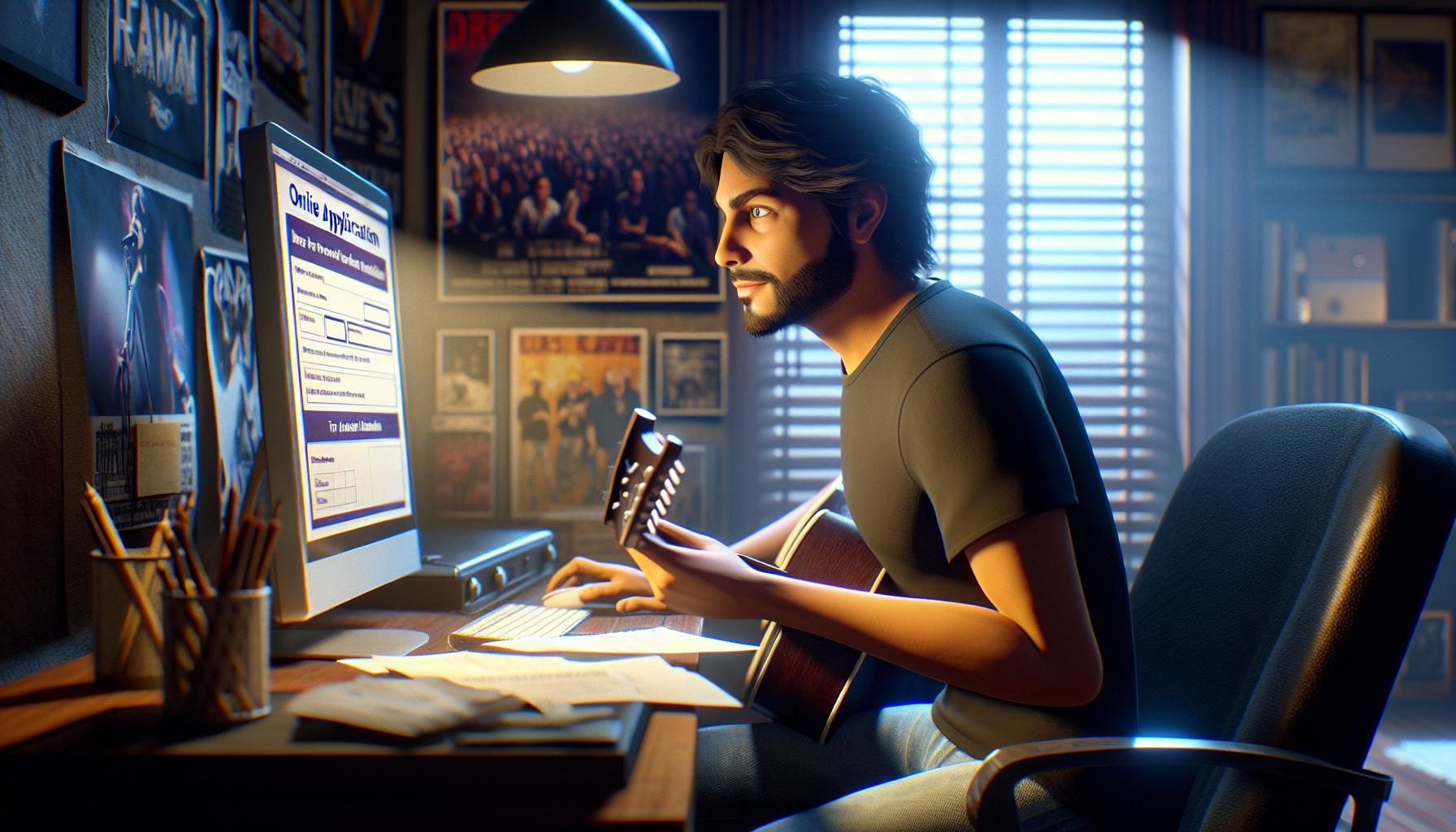Dreaming of playing your tunes to a sea of music lovers? You’re not alone. Getting booked for music festivals is a common goal for many artists. It’s a chance to showcase your talent, connect with fans, and share the stage with some of the industry’s biggest names.
But let’s face it, landing a festival gig isn’t a walk in the park. It’s competitive, challenging, and requires a strategic approach. In this article, I’ll share insider tips and proven strategies to increase your chances of getting booked.
Whether you’re an emerging artist or a seasoned performer looking to break into the festival circuit, this guide is for you. Let’s dive in and start making your music festival dreams a reality.
Contents
Researching Music Festivals
Unlocking the first step to get booked for music festivals lies within diligent research. It’s essential to know what you’re aiming for, and keen insight into the festival scene is an unwavering requirement.
Kick start your musical journey by identifying the right festivals for your style and genre of music. Each festival has its preferences, and the audience’s music taste varies. Do not undervalue the power of aligning your music with the festival’s vibe. Some offer a platform for hip-hop, others for techno, jazz, blues, or a mix. Ensure your music resonates with the festival theme; it improves your chances of getting noticed.
Furthermore, getting acquainted with festival timelines is another crucial step. Most festivals recruit artists many months, or even a year in advance. Application deadline matters if you’re serious about breaking into the festival scene. Manage your time wisely and stay ahead of the game.
Take a closer look at previous performers too. Festivals often rebook the same artists, especially if they were crowd favorites. Observe their genre, performance style, and audience interaction. It can offer significant insights into what the festival organizers are looking for.
Lastly, don’t shy away from feedback. Reach out to artists who’ve performed at these festivals, or engage a music mentor. You’d be surprised at how much you can learn from their experiences.
In essence, extensive research needs to be your best friend in this endeavor. The more informed you are, the better chances of standing out, getting noticed and eventually, landing that dream festival gig.
Building Your Festival Portfolio

Now that we’ve covered the importance of research, let’s dive into the next critical step: building your festival portfolio. Your festival portfolio is like the resume you’d submit for a traditional job but in the music world, it’s way cooler.
The first task is to compile a collection of your original music. This includes any released albums, EPs, and singles. Don’t leave out well-crafted unreleased material as it could showcase your versatility and growth as an artist.
Balancing your original music with some recorded live performances is also important. Festival organizers often consider the artist’s stage presence and audience engagement skills. It’s essential to have high-quality videos that show you’re not only excellent in the studio but also on stage. YouTube channel links or other public video platforms could be potential goldmines for this.
Press kits also play a crucial role in your portfolio. A press kit typically includes:
- Your biography
- Professional promotional photos
- Links to your music and samples
- Press releases and media coverage
Use an appealing layout and design for your press kit. It’s the wrapping paper of your musical gift, after all. Remember, first impressions matter. Make sure your press kit is as polished and professional as your tracks.
Next, gather testimonies from industry peers or fans. These can offer a solid credibility boost. Festival organizers like knowing others in the scene vouch for you and your music. This being said, always ensure the feedback is genuine. Authenticity speaks louder than fancy words.
Finally, consider aligning your social media presence with your music style and brand. It’s worth investing time in creating a harmonious, interesting, and engaging online persona. Followers’ engagement, likes, shares, and comments shout to the festival organizers that you have fans eagerly waiting for your next performance.
As you can see, preparing your festival portfolio isn’t a cakewalk. But trust me, with some creativity, effort, and a pinch of patience, you can craft a portfolio that stands out from the crowd. Remember, it’s all about showcasing your talent, proving your professionalism, and aligning with the festival vibes.
Crafting an Impressive Press Kit
One of the most significant steps in building your festival portfolio is creating an impressive press kit. It’s this package of media materials that provides a snapshot of who you are as an artist and what you bring to the stage.
Your press kit should include your music samples, bio, and high-quality promotional photos. Make sure your bio not only details your musical journey but also captures your unique style and personality. This is your chance to let festival organizers peer through the looking glass of who you are as an artist. Likewise, your promotional photos should capture your stage presence and energy, reflecting the experience you intend to bring to their audience.
Next, dive into your discography. Showcase your best works and remember to balance it with live performances. Festival organizers want to see your stage prowess; after all, live music is the core essence of a music festival. Captivating studio tracks are excellent, but an electrifying live performance can seal the deal.
In addition to these elements, gather and include testimonials or reviews from industry peers or fans. It provides social proof that you’re professional, consistent, and can put up a great show. Couple these testimonials with press mentions, if you have them, and any awards or recognitions you’ve received.
Finally, tie your press kit together with your social media links. You’ve worked hard to align your social media presence with your music style and brand, now it’s time to leverage it.
Remember, your press kit can be the key to unlocking your festival booking potential. Like a resume or portfolio in other industries, it’s the gateway to showcasing your talent and proving your professionalism.
Focus on these key areas when creating your press kit:
- Music samples
- Bio
- Promotional photos
- Discography
- Testimonials
- Social media links
By doing this, you’ll stand out from the crowd. It’s all about providing a vibrant snapshot of what you can bring to their festival stage. After all, they’re not just booking a band or an artist, they’re curating an experience for their festival-goers. It’s your press kit that can effectively communicate that you’re a noteworthy addition to that experience.
Networking with Industry Professionals
Networking is an indispensable component in getting booked for music festivals. It’s not always just the music you play. It’s also the relationships you’ve cultivated within the music community that can offer leverage.
First, let’s focus on the people involved in organizing music festivals. A directory is your friend here. It’s easy to find festival directories online that provide detailed information about who did what in previous seasons. Use it as a starting point to begin reaching out to festival directors, music curators, and promoters. Unless you’ve already made a name for yourself, they’ll rarely set aside time for unsolicited meetings. However, you can still send them your press kit or introduce your band in a brief yet captivating email.
A critical networking platform to consider is the music conference. Music conferences are often considered the Mecca for networking opportunities in the music industry. Here, you’ll meet booking agents, managers, and most importantly, festival organizers. Key industry events like South by Southwest (SXSW), the Great Escape, and Canadian Music Week often house hundreds of potential connections.
Ensure you’re prepared for these events:
- Have a clear idea of whom you’d like to meet
- Research their work and think of thoughtful questions to ask
- Practice your elevator pitch while keeping it genuine and engaging
- Have your polished press kit ready
- Follow up after the event
Having a strong online presence is essential, too. Social media platforms like LinkedIn, Twitter, and Facebook have made it easier than ever to connect with music industry professionals. Regularly interact with them and be visible. Keep in mind, however – it’s about forming relationships, not just about promoting your band.
Overall, networking may feel daunting but it’s a worthwhile investment of your time. It opens doors that even the most epic demo or the slickest press kit cannot. You’ll meet mentors, discover performance opportunities, and potentially even score your dream festival gig. So, start refining those people skills and get networking.
Submitting Your Application

Once you’ve tackled the networking aspect of the music industry, it’s time to zero in on the application process. Remember, applying for music festivals isn’t about sending out a mass email and praying for the best. It’s a lot more detailed and tailored. Your journey doesn’t end at getting contacts. It’s just the beginning.
Your first step should involve researching the festivals you aim to play. Understand their history, their audience, and the kind of music they prefer. This will create insight into what type of music they’re looking for, the audience they attract, and the associated experience they uphold. This isn’t something that everyone does, but it’ll set you ahead of the crowd. More importantly, it’ll ensure your music aligns with their preference.
Next, create a compelling proposal. Dive right into specifics – include a brief band biography, music samples, links to your press kit, and previous gig experiences. Respect the festival’s time by keeping your application to the point, yet informative.
One good tip? Find a unique selling point, or USP. This could be your distinct music style, a high energy stage presence, or even a record of consistently drawing large crowds. Highlight this USP in your application to stand out.
A common mistake I’ve seen some artists make is not following the festival’s application rules. These guidelines are there for a reason. Deviating from them not only shows your lack of attention to detail but also puts your application at risk of being outright rejected.
Lastly, discuss potential performance dates and always leave your contact information readily available. You’d be surprised at how often these two basic details are missed out.
By following these guidelines, you’ll create an application that’s both compelling and professional. It’s no guarantee of getting the gig, but it’ll increase your odds significantly.
Conclusion
So there you have it. To get your band booked at music festivals, it’s all about being strategic and meticulous in your approach. Do your homework on the festivals that align with your music style and audience. Tailor your application to each festival’s specific needs, showcasing your band’s unique appeal. Include a compelling band bio, engaging music samples, and a professional press kit. Don’t forget to highlight your previous gig experiences. And remember, it’s crucial to stick to the application rules and provide accurate contact information. By following these steps, you’re not just applying – you’re presenting a persuasive case for why your band deserves a slot. Now, it’s time to take your shot and start applying. The festival stage awaits you!
